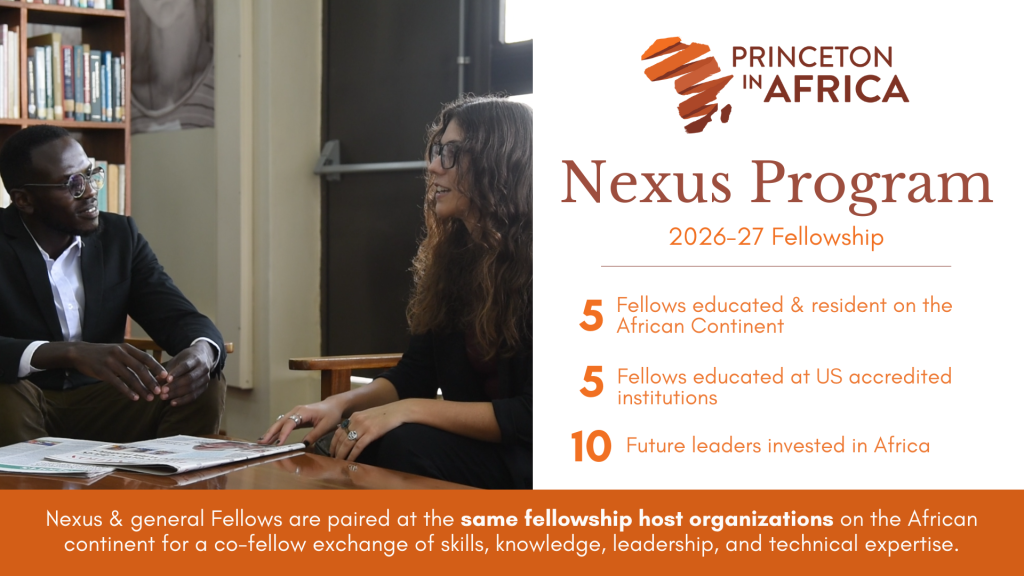
Nexus

Princeton in Africa Nexus Program
In 2023, Princeton in Africa expanded our model to include the Nexus program! Princeton in Africa’s Nexus program pairs 5 Nexus Fellows, educated and resident on the African continent, with 5 co-Fellows from the general fellowship program who were educated at U.S.-accredited institutions. Each pair of Fellows, one Nexus Fellow and one general Fellow, works together at one of Princeton in Africa’s host organizations on the African continent. During their year-long Princeton in Africa fellowships, the Nexus Fellow and general co-Fellow have the opportunity to exchange skills, knowledge, leadership experience, and technical expertise with one another while working together to support their host organization’s mission and learn about their host community. The Nexus program is an addition to PiAf’s signature fellowship program tailored for young leaders educated at U.S.-accredited institutions.
The program is designed to enrich our Fellows’ experience and professional growth on the African continent and bring young professionals educated in African institutions into our community of over 700 alumni spanning all over the world.
How does the Nexus program differ from the general fellowship program?
- Eligibility Requirements: The Nexus program is intended for graduates of African universities who have citizenship in an African country and are resident on the African continent. The general fellowship program is intended for graduates of US-accredited universities. Please see our Apply page for more information about eligibility requirements for the Nexus program.
- Host Organizations: Nexus applicants can only be considered for fellowship posts at a list of Nexus-designated organizations. The list of Nexus organizations and posts can be found on our fellowship application and on our List of Prospective Host Organizations. The list of Nexus-eligible posts will be updated through the fall and spring and are subject to change. Past Nexus organizations have included:
- African School of Economics, Benin (2023-24)
- Emerging Leaders Foundation Africa, Kenya (2023-24)
- International Livestock Research Institute (2024-25)
- International Rescue Committee, Kenya (2023-24, 2024-25)
- International Rescue Committee, Somalia (based in Kenya) (2023-24, 2024-25)
- Megnacio Company Ltd., Tanzania (2024-25)
- Mpala Research Centre, Kenya (2023-24)
- Warc Africa, Ghana (2024-25)
- Focus on Exchange: All Nexus Fellows will be placed in their host organizations alongside a co-Fellow from the general fellowship program with the goal that the Nexus Fellow and general co-Fellow will exchange skills, knowledge, leadership experience, and technical expertise with one another in addition to working together to support their host organization’s mission. This opportunity for exchange and relationship-building is a key part of the Nexus program. While some Fellows on the general fellowship program will be the only Fellow in their organizations, all Nexus Fellows and general co-Fellows will have another Fellow placed at the same organization with whom they can exchange skills and share their fellowship experiences.
- Application Requirements: Applicants for the Nexus program will need to submit a Proof of Enrollment document from their undergraduate university in addition to the other documents required by all applicants. Applicants to the general fellowship program are not required to provide a Proof of Enrollment document. Please see our Apply page for a full list of application requirements for Nexus applicants.
Who is eligible to apply for the Nexus program?
To be eligible for the 2026-27 Princeton in Africa Fellowship, Nexus applicants must:
- Be young professionals or current undergraduates graduating by June 2026 at the time of application.*
- Hold a bachelor’s, master’s (or equivalent), or a Ph.D. from an African university.
- Have full professional proficiency in speaking, reading and writing English as defined by the CEFR (Level C1 and above). Professional proficiency in French is preferred for some posts.
- Be no older than 35 years of age for the duration of the fellowship year (born on or after September 1, 1991).
- Hold a passport valid through the end of the fellowship year (August 2027).
- Have citizenship in an African country and have current residency in an African country. Applicants with dual U.S. citizenship will not be considered.
Please see our Apply page and additional FAQs on our website to learn more.
*Nexus applicants must not be enrolled in any graduate, doctoral, or equivalent advanced academic programs during their fellowship year.
How do I apply for the Nexus program?
If you meet the eligibility requirements for the Nexus Program, you can apply by submitting a Princeton in Africa fellowship application by our October 2025 deadline. Please see our Apply page page for more information about the application. Both Nexus and general applicants will apply for the fellowship using the same application form.
Please note that all required documents must be submitted by the application deadline. We are not able to accept late materials and will not review applications that do not include all required documents. Please read over the list of application requirements carefully and ensure that you request your transcript, proof of enrollment document, and letter of recommendation well in advance of the deadline.
2026-27 Orientation
All Fellows are required to attend the virtual 2026-27 orientation live and in real-time. The orientation will take place in Eastern Daylight Time and will be hosted via Zoom so that all Fellows can join virtually and interact with PiAf staff, presenters, and other Fellows on the program.
When applying, applicants must attest that if selected as a Nexus Fellow, they will be able to attend Princeton in Africa’s full virtual orientation in real-time. Orientation starts on Friday, June 5th and concludes on Sunday, June 7th, 2026.
